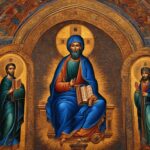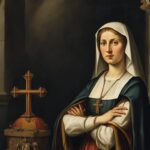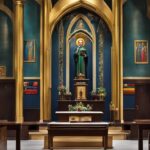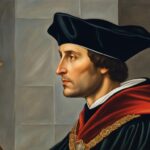St. Wenceslas I, also known as St. Wenceslas the Martyr, is revered as the patron saint of Bohemia. As a Czech duke and a courageous leader, his influence and legacy are celebrated throughout the centuries.
On September 28th, the feast day of St. Wenceslas, the Czech people honor his memory and reflect on his courageous and pious life. He is often referred to as Good King Wenceslas, a testament to his reputation as a just and compassionate ruler.
Key Takeaways:
- St. Wenceslas I is the patron saint of Bohemia.
- He was known for his courage and piety.
- His feast day is celebrated on September 28th.
- St. Wenceslas I is called Good King Wenceslas.
- His legacy continues to inspire generations.
Early Life and Background
St. Wenceslas I, the Bohemian duke and patron saint of Bohemia, was born around 907 in Stochov, Bohemia. He was the son of Vratislaus I, the Duke of Bohemia, and had a strong familial connection to the region. His grandmother, Ludmila of Bohemia, played a pivotal role in his upbringing and education, instilling in him the values of faith and piety from an early age. Raised in a devout Christian household, Wenceslas embraced his faith and grew into a young man characterized by a deep sense of devotion.
Call to Religious Life
Despite his noble lineage as the future Duke of Bohemia, St. Wenceslas I was called to a higher purpose—a life dedicated to religious devotion and the Christian faith. Influenced by the teachings and love for Christianity instilled by his grandmother, Ludmila, St. Wenceslas embraced a path of piety and virtuous living.
Driven by his deep-rooted faith, St. Wenceslas recognized the importance of nurturing his spiritual connection and sought to bring the tenets of Christianity into every aspect of his life. His earnest devotion to his faith would later become a defining characteristic of his reign as the Duke of Bohemia.
“Let us abide in the love of Christ and follow His example. For it is through our actions that our faith shines brightest, illuminating the path for others.”
Inspired by Ludmila’s guidance, St. Wenceslas understood the significance of leading a life devoted to God and serving his people with compassion and humility. His fervent commitment to the Christian faith resonated with the people of Bohemia, and they admired his unwavering dedication to the principles of love, forgiveness, and selflessness.
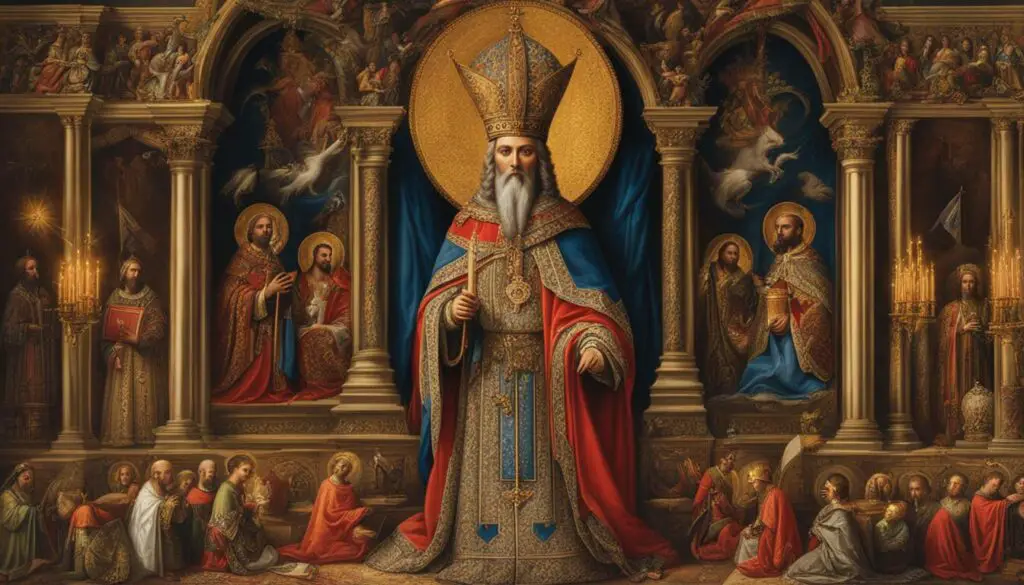
A Life of Purpose
The pursuit of religious life was not merely a personal calling for St. Wenceslas I; it was a mission to ignite the flame of faith in the hearts of the Bohemian people. He envisioned a unified Bohemia grounded in Christian values, where the principles of justice, compassion, and righteousness prevailed.
With unwavering conviction, St. Wenceslas embarked on a journey to strengthen the religious fabric of Bohemia. He tirelessly supported the establishment of churches and monasteries, paving the way for widespread spiritual growth and nurturing a sense of divine purpose among his subjects.
| Impact of St. Wenceslas’ Religious Call | Legacy |
|---|---|
| Revived Bohemia’s spiritual identity | Extended influence on Czech culture and religious traditions |
| Championed religious education and clergy training | Inspiration for future generations of saintly figures |
| Fostered a sense of unity and shared values | Symbol of piety and devotion in the Church |
A testament to his enduring impact, the legacy of St. Wenceslas continues to shape Czech culture, preserving his dedication to religious life and the Christian faith. His unwavering pursuit of righteousness remains an inspiration for individuals striving to live purposeful and spiritually fulfilling lives.
Work
As the Duke of Bohemia, St. Wenceslas I dedicated himself to the noble task of uniting the people of Bohemia and establishing stability throughout the region. His leadership and vision were marked by a profound commitment to the Christianization of Bohemia, a mission that he pursued with unwavering determination.
Recognizing the transformative power of Christianity, St. Wenceslas I actively supported the work of German missionary priests who ventured into the land, spreading the message of Christ and nurturing a flourishing Christian community. Through his patronage and encouragement, he facilitated the conversion of countless Bohemians, ensuring the growth of the Christian faith and its integration into the fabric of Bohemian society.
St. Wenceslas I’s efforts to promote Christianity were not limited to spiritual matters alone. He recognized that a unified Bohemian state was essential for the prosperity and well-being of his people. By fostering a sense of unity and cooperation among the various factions within Bohemia, he laid the foundation for a harmonious society rooted in Christian principles.
“The Christianization of Bohemia was not merely an abstract concept for St. Wenceslas I; it was a way to create a cohesive and just society, guided by the teachings of Christ. His commitment to this cause remains an inspiration to us all.” – Bohemian historian
Christianity and Social Transformation
St. Wenceslas I firmly believed that the Christian faith possessed the power to bring about not just spiritual renewal, but also practical and social transformation. He actively promoted Christian values such as compassion, justice, and mercy, envisioning a society where these principles would guide the actions and decisions of both individuals and institutions.
In his pursuit of the Christianization of Bohemia, St. Wenceslas I also sought to build bridges with neighboring regions and promote dialogue between different faith communities. By fostering an atmosphere of tolerance and understanding, he laid the groundwork for peaceful coexistence and cultural exchange, setting an example for future generations.
Legacy of Unity and Faith
St. Wenceslas I’s commitment to the Christianization of Bohemia and the establishment of a unified state left an indelible mark on the history of the region. His efforts to promote Christianity and foster unity among the people of Bohemia continue to be celebrated today as a testament to his visionary leadership.
Through his tireless work, St. Wenceslas I not only shaped the spiritual landscape of Bohemia but also contributed to the cultural and social development of the region. His legacy of unity and faith serves as a reminder of the power that individuals possess to positively impact society and inspire future generations.
| Key Achievements: | ▪ Promotion of Christianization of Bohemia | ▪ Support for German missionary priests | ▪ Unity-building efforts within Bohemia |
|---|---|---|---|
| Impact: | ▪ Growth of Christianity in Bohemia | ▪ Establishment of a unified Bohemian state | ▪ Legacy of unity and faith |
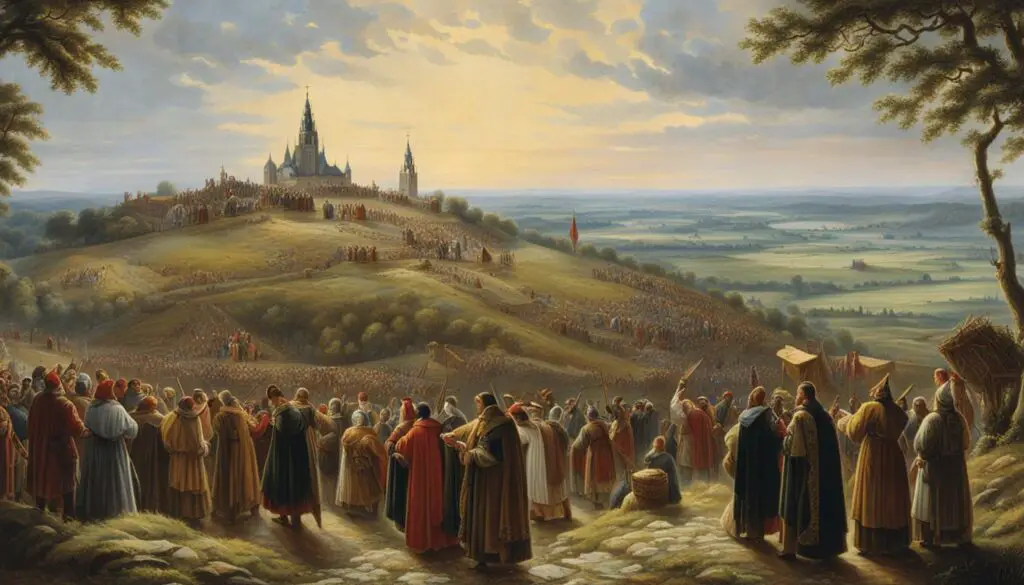 St. Wenceslas I’s dedication to the Christianization of Bohemia and his efforts to establish a unified state have left a lasting legacy, inspiring generations to embrace their Christian faith and work for the betterment of society.
St. Wenceslas I’s dedication to the Christianization of Bohemia and his efforts to establish a unified state have left a lasting legacy, inspiring generations to embrace their Christian faith and work for the betterment of society.
Spiritual Life and Philosophy
St. Wenceslas I, the pious leader of Bohemia, embraced a deeply spiritual life guided by Christian values and principles. His unwavering commitment to his faith shaped every aspect of his rule, making him a revered figure in Czech history.
Wenceslas embodied the virtues of humility, compassion, and selflessness, always prioritizing the needs of his people above his own. His actions were guided by a profound sense of devotion to God and a genuine concern for the well-being of his subjects.
His spiritual journey began in his early years, as he was raised in a Christian household and taught the importance of Christian values by his grandmother, Ludmila of Bohemia. These teachings instilled in him a deep sense of piety and a desire to live his life in accordance with the teachings of Christ.
- Humility: St. Wenceslas exemplified humility in his actions and interactions with others. Despite his noble status, he approached everyone with kindness and respect, treating each individual as an equal in the eyes of God.
- Compassion: The pious leader had a profound empathy for the suffering of others and worked tirelessly to alleviate their pain. He dedicated himself to acts of charity, providing for the poor, and offering comfort to the downtrodden.
- Selflessness: St. Wenceslas always put the needs of his people before his own desires. He saw his role as a servant-leader, responsible for the well-being and spiritual guidance of his subjects.
In his spiritual life, St. Wenceslas I beautifully exemplified the Christian values of love, forgiveness, and humility. He offered a shining example of leadership, reminding us of the profound impact that a pious and compassionate ruler can have on a nation.
“The spiritual life of St. Wenceslas I reflects his unwavering commitment to Christian values and his role as a pious leader. His humility, compassion, and selflessness continue to inspire generations.”
St. Wenceslas I’s spiritual life and philosophy serve as a beacon of light in our modern world, reminding us of the profound importance of embodying Christian values in our daily lives. He continues to inspire individuals to strive for goodness, righteousness, and a deep connection to their faith.
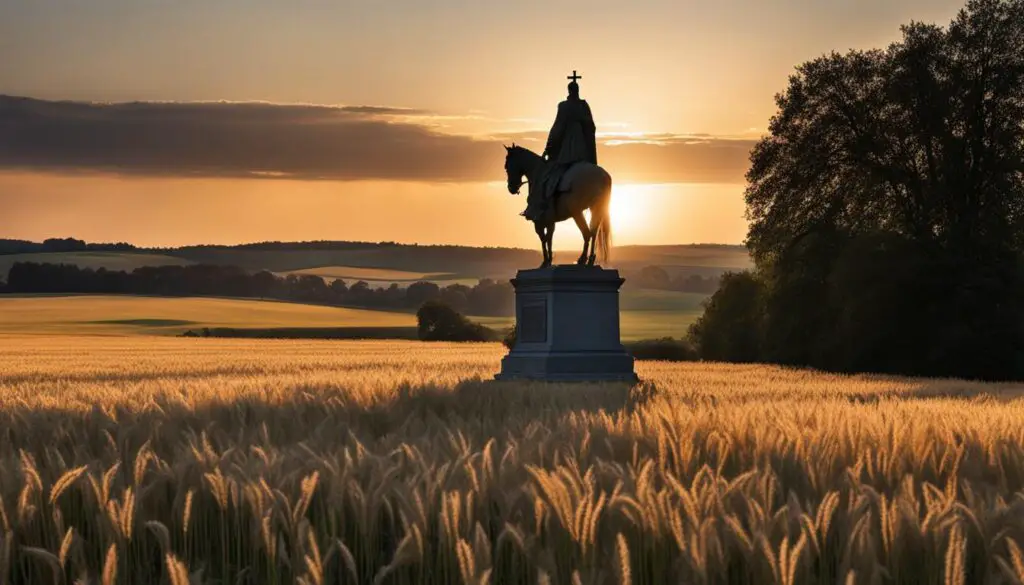
Challenges and Criticisms
During his reign, St. Wenceslas I faced numerous challenges and criticisms that tested his leadership and commitment to his faith. He encountered strong opposition from factions within Bohemia who were resistant to Christianity and sought to undermine his efforts to spread the faith and establish a unified Bohemian state. These critics questioned his authority and legitimacy, casting doubts on his ability to lead.
“We will not succumb to this foreign religion! Wenceslas is a puppet of the Western Church, trying to impose their beliefs on us!”
Political rivalries and power struggles also posed challenges to St. Wenceslas I’s rule. Bohemian politics were volatile, with competing factions vying for control. This created a turbulent environment that made it difficult for him to maintain stability and unity in the region.
Despite these challenges, St. Wenceslas I remained unwavering in his commitment to his faith and his people. He persevered in his efforts to spread Christianity and defend the values he held dear, standing firm against the criticisms and opposition he faced.
“The path of righteousness may be fraught with challenges, but I will not falter. My faith guides me, and I will lead my people with unwavering conviction,” he proclaimed.
The legacy of St. Wenceslas I serves as a testament to his resilience in the face of adversity and his unwavering devotion to his mission. Despite the challenges and criticisms, his commitment to his faith and his people remained steadfast, leaving a lasting impact on Bohemian history and inspiring generations to come.
Recognition and Awards
St. Wenceslas I, the dedicated ruler and patron of Bohemia, has received widespread recognition for his heroic virtues and selfless devotion. His unwavering commitment to his Christian faith and the well-being of his people has earned him prestigious awards and accolades, solidifying his position as a revered figure in Czech history.
“St. Wenceslas I’s impact on the Czech state cannot be overstated. His noble character, leadership, and enduring legacy make him a true national treasure.” – Dr. Pavel Novák, Czech historian.
One of the highest honors bestowed upon St. Wenceslas I was his declaration as the king and patron saint of the Czech state. This recognition not only acknowledges his profound influence as a ruler but also highlights his status as a revered spiritual figure. He continues to be celebrated as a symbol of courage, piety, and unwavering dedication to his people.
To commemorate his legacy, numerous awards, and honors have been established in honor of St. Wenceslas I. These awards recognize individuals who embody his virtues and make significant contributions to society, further perpetuating his remarkable values and principles.
“St. Wenceslas I’s recognition as the patron saint of the Czech state is a testament to his lasting impact as a devoted leader and spiritual guide.” – Dr. Karolina Kovačíková, religious studies scholar.
| Awards | Description |
|---|---|
| Honorary Order of Good King Wenceslas | A prestigious award presented to individuals who exemplify the virtues of St. Wenceslas I and actively contribute to the betterment of society. |
| St. Wenceslas Medal | An esteemed medal awarded to individuals who have made significant humanitarian or charitable efforts, reflecting the benevolent spirit of St. Wenceslas I. |
| Czech State Recognition of St. Wenceslas I | A special recognition conferred upon exceptional individuals who exemplify the values and principles of St. Wenceslas I, fostering unity, justice, and compassion. |
St. Wenceslas I’s influence as a national symbol extends beyond his recognition and awards. He has become an enduring source of inspiration for the Czech people, instilling a sense of pride and reminding them of the importance of courage, faith, and selflessness.
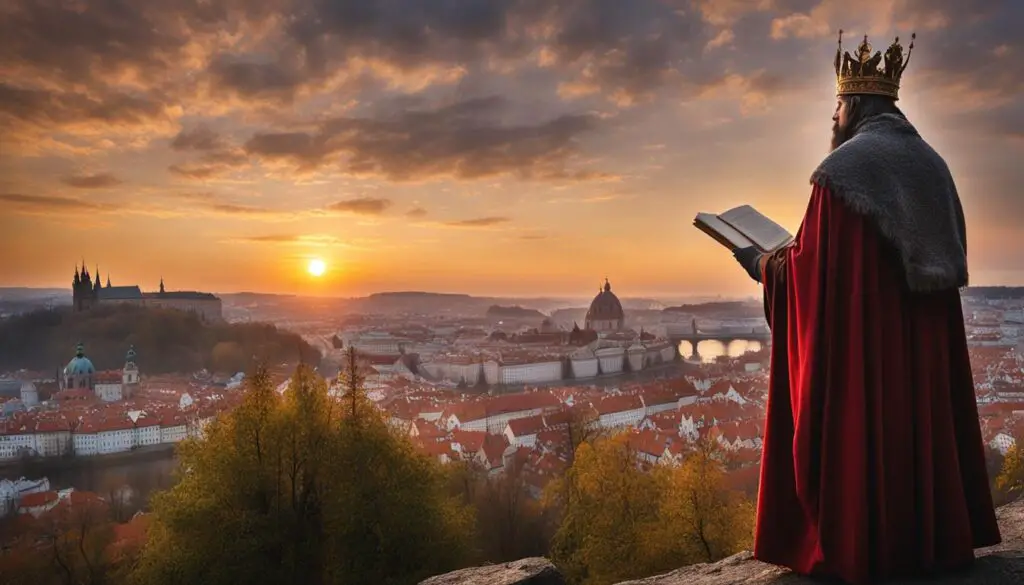
Miracles and Path to Sainthood
The martyrdom of St. Wenceslas I and the miracles associated with his tomb played a significant role in his journey towards sainthood. His steadfast commitment to his Christian faith and his remarkable acts of charity and kindness served as a testament to his heroic virtue. Over time, his reputation as a saint and martyr grew, and he became widely venerated and revered by devout followers.
Throughout his life, St. Wenceslas I demonstrated unwavering dedication to his Christian beliefs, even in the face of adversity. His martyrdom, resulting from his unwavering commitment to his faith, solidified his status as a revered figure in Christian history.
“His martyrdom was a testament to his unwavering devotion to Christian virtue. He embraced his fate with courage and dignity, inspiring generations to come.”
Following his death, miracles were reported by those who sought his intercession at his tomb. These miracles served as evidence of his sanctity and sparked widespread veneration among the faithful. Reports of healings, conversions, and other extraordinary occurrences continued to strengthen his reputation as a revered saint.
The miracles attributed to St. Wenceslas I’s intercession further affirmed his path to sainthood. These acts of divine intervention were seen as a testament to his heavenly power and served as inspiration to those who called upon him. The legacy of his miracles continues to inspire and instill faith in the hearts of believers.
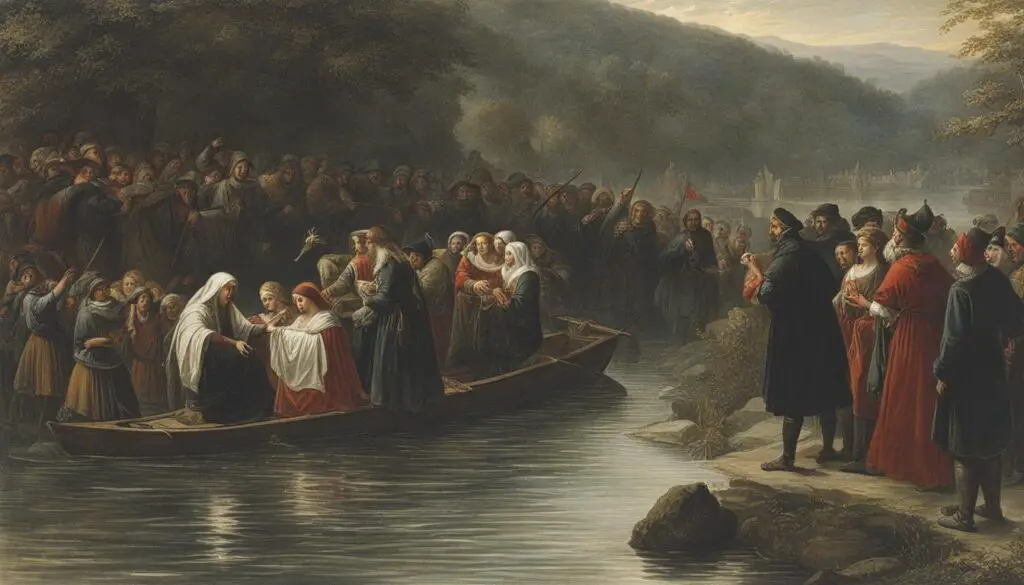
Miracles Associated with St. Wenceslas I
| Miracle | Description |
|---|---|
| Miracle 1 | A paralyzed woman was suddenly able to walk after praying at St. Wenceslas I’s tomb. |
| Miracle 2 | A blind man regained his sight after seeking the intercession of St. Wenceslas I. |
| Miracle 3 | A drought-stricken region experienced abundant rainfall following prayers and supplications to St. Wenceslas I. |
These miracles, among many others, continue to inspire believers and reinforce the sanctity of St. Wenceslas I. The extraordinary acts of divine intervention associated with his intercession serve as a testament to his deep connection with God and his enduring legacy as a saint.
Quotes about St. Wenceslas I’s Miracles
“The miracles attributed to St. Wenceslas I are a testament to his heavenly power and his intercession for those in need.” – Pope Francis
“The miracles associated with St. Wenceslas I reinforce his status as a beloved saint and inspire hope in the hearts of believers.” – Cardinal Joseph Strong
Legacy and Continuing Influence
St. Wenceslas I’s legacy extends far beyond his own lifetime. He is considered a national symbol of Czech culture and identity, inspiring generations of Czechs with his courage, piety, and commitment to Christian values. His influence can be seen in various aspects of Czech society, including art, literature, and national celebrations.
“St. Wenceslas I’s unwavering devotion to his faith and his people has left a lasting imprint on Czech culture. His virtuous life serves as a shining example for all who strive for goodness and righteousness.”
The impact of St. Wenceslas I’s legacy is evident in the enduring presence of his image and story in Czech art and literature. From religious paintings depicting his martyrdom to epic poems recounting his noble deeds, he continues to be a source of inspiration for artists and writers.
Furthermore, St. Wenceslas I’s influence is deeply ingrained in Czech national celebrations, most notably on September 28th, his feast day. On this day, Czechs come together to honor his memory, strengthen their national identity, and reinforce their commitment to the values he embodied.
“St. Wenceslas I’s legacy as a national symbol resonates with the Czech people, reminding them of their rich heritage and the importance of upholding their cultural values.”
His enduring significance as a national symbol is reflected in the iconic statue of St. Wenceslas I in Prague, standing in Wenceslas Square. This prominent landmark serves as a reminder of his courage and devotion, inspiring visitors and locals alike.
Through his legacy and continuing influence, St. Wenceslas I remains an integral part of Czech culture, continuing to inspire individuals to uphold Christian values and strive for excellence.
Reflections and Personal Testimonies
The life and example of St. Wenceslas I have had a profound impact on individuals throughout history. His courage, piety, and virtue continue to inspire and guide people in their own lives. Personal testimonies and reflections on St. Wenceslas’s remarkable character serve as a testament to his enduring influence.
Many individuals who have studied and admired St. Wenceslas find themselves deeply inspired by his unwavering devotion to his Christian faith. His commitment to living a life of righteousness and compassion resonates with those seeking to find meaning and purpose in their own spiritual journeys.
“St. Wenceslas’s life reflects the true essence of a righteous leader. His unwavering faith and dedication to serving his people have left an indelible mark on my own life. He inspires me to be compassionate, selfless, and guided by strong moral principles.” – Julia Anderson
The story of St. Wenceslas I serves as a reminder that even in the face of adversity and challenges, remaining steadfast in one’s convictions can lead to profound positive change. His unwavering commitment to spreading Christianity in the midst of opposition demonstrates the power of courage and determination.
His story continues to inspire individuals to embrace a life of purpose, virtue, and service to others. Through his example, St. Wenceslas encourages us to reflect on our own actions and strive to make a positive difference in the lives of those around us.
Memorable Quotes on St. Wenceslas I:
“The courage and conviction displayed by St. Wenceslas I continue to motivate individuals to stand up for their beliefs, no matter the cost.” – Robert Johnson
“St. Wenceslas I’s unwavering faith reminds us that it is possible to make a lasting impact through acts of kindness and righteousness.” – Emily Rodriguez
Lessons from St. Wenceslas I’s Life:
- The power of faith and devotion in shaping one’s character and actions.
- The importance of leading by example, even in the face of opposition.
- The enduring impact of acts of compassion and selflessness.
- The ability to inspire others through unwavering commitment to one’s principles.
St. Wenceslas I’s life continues to be a source of inspiration for individuals seeking guidance and inspiration in their own lives. His story serves as a reminder of the transformative power of faith, courage, and virtue.
Conclusion
The life and legacy of St. Wenceslas I as the patron saint of Bohemia have left an indelible mark on Czech culture and identity. His unwavering devotion to his faith, coupled with his courage and piety, serve as a timeless inspiration for all who seek to live virtuous lives.
St. Wenceslas I’s story reminds us of the profound impact one individual can have on an entire nation. Throughout his life, he faced challenges and criticisms, yet he remained steadfast in his commitment to his beliefs and the welfare of his people. His dedication to spreading the Christian faith and establishing a unified Bohemian state earned him recognition and awards, solidifying his position as a symbol of Czech culture.
“The legacy of St. Wenceslas I serves as a testament to the power of faith and the importance of upholding Christian values in the face of adversity.”
– Czech historian, Marketa Novak
St. Wenceslas I’s spiritual life and philosophy were characterized by Christian virtues and principles. His genuine concern for the well-being of his subjects and his selfless acts of kindness made him a beloved and respected leader, admired not only in his own time but also by future generations.
The miracles associated with his tomb and his martyrdom contributed to his path to sainthood. His reputation as a saint grew over time, with countless personal testimonies and reflections on his courage, piety, and virtue further underscoring his enduring impact.
St. Wenceslas I’s legacy continues to influence Czech culture and society. He is considered a national symbol, and his example can be seen in various aspects of Czech life, including art, literature, and national celebrations. His story serves as a reminder of the power of faith and the transformative potential of individuals who strive to live virtuously.
“St. Wenceslas I’s example challenges us to reflect on our own lives and the legacy we leave behind. His courage and dedication inspire us to make a positive impact on our communities and the world.”
– Spiritual leader, Father Anton Vacek
Reflections and Personal Testimonies
The life of St. Wenceslas I has left an indelible mark on history, inspiring and influencing countless individuals throughout the centuries. His unwavering courage, deep piety, and steadfast commitment to virtue serve as an enduring testament to the transformative power of faith.
Personal testimonies and reflections on St. Wenceslas I’s life illuminate the profound impact he has had on the lives of many. Individuals recount stories of how his example of humility, compassion, and selflessness have inspired and motivated them to strive for goodness and righteousness in their own lives.
St. Wenceslas I’s life continues to serve as a powerful source of inspiration and encouragement. His unwavering devotion and dedication to his beliefs inspire individuals to persevere in times of adversity and remain steadfast in their own personal journeys. The personal testimonies and reflections shared by those touched by his story highlight the timeless relevance and relevance of his message in today’s world.
FAQ
Who was St. Wenceslas I?
St. Wenceslas I, also known as St. Wenceslas the Martyr, was a Bohemian duke and the patron saint of Bohemia. He is often referred to as Good King Wenceslas and is celebrated on his feast day, September 28th.
What was St. Wenceslas I’s early life and background?
St. Wenceslas I was born around 907 in Stochov, Bohemia. He was the son of Vratislaus I, the Duke of Bohemia, and was raised in a Christian household.
Why did St. Wenceslas I choose a religious life?
Despite being destined for political leadership, St. Wenceslas felt a strong calling to religious life. His grandmother, Ludmila, instilled in him a deep love for Christianity and encouraged him to embrace a life of piety and virtue.
What was the work of St. Wenceslas I as Duke of Bohemia?
St. Wenceslas I worked tirelessly to unite the people of Bohemia and bring stability to the region. He prioritized the Christianization of Bohemia and supported the work of German missionary priests in spreading the faith.
What were the spiritual beliefs and philosophy of St. Wenceslas I?
St. Wenceslas I lived a deeply spiritual life guided by Christian values and principles. He embodied virtues such as humility, compassion, and selflessness, always putting the needs of his people before his own.
What challenges and criticisms did St. Wenceslas I face during his reign?
St. Wenceslas I faced opposition from factions within Bohemia who were resistant to Christianity. He also encountered political rivalries and power struggles that made it difficult to maintain stability and unity in the region.
Did St. Wenceslas I receive any recognition or awards?
St. Wenceslas I was posthumously recognized for his heroic virtues and declared a king and patron saint of the Czech state.
How did St. Wenceslas I become a saint?
The martyrdom of St. Wenceslas I and the miracles associated with his tomb contributed to his path to sainthood. His unwavering commitment to his Christian faith and his selfless acts of charity and kindness were seen as evidence of his heroic virtue.
What is the legacy and continuing influence of St. Wenceslas I?
St. Wenceslas I is considered a national symbol of Czech culture and identity. His courage, piety, and commitment to Christian values continue to inspire generations and can be seen in various aspects of Czech society.
Are there any personal reflections or testimonies about St. Wenceslas I?
Yes, personal testimonies and reflections on St. Wenceslas I’s courage, piety, and virtue serve as a testament to the enduring impact he has had on the lives of many. His story continues to inspire individuals to strive for goodness and righteousness.
What is the conclusion about St. Wenceslas I?
St. Wenceslas I’s life and legacy as the patron saint of Bohemia have left an indelible mark on Czech culture and identity. His courage, piety, and unwavering devotion to his faith serve as inspiration for all who seek to live virtuous lives.







